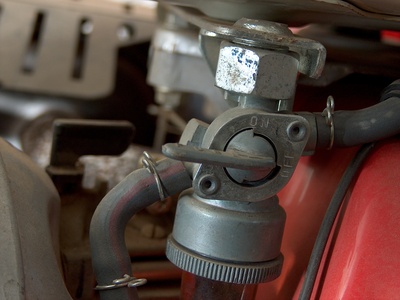
Oxyhydrogen, or Hho, is a chemical formed by reacting a mixture of hydrogen, or H, and oxygen, or O2, in a 2 to1 ratio, similar to water. Hho has been used in welding and cutting at high temperatures for many years, but, as of 2010, there are proposals for using it as ordinary car fuel. While this may be possible with the right research, the substance has many dangers that may outweigh its benefits.
The most obvious danger is that of a hydrogen explosion. Build up of Hho gas or a general increase in pressure in the system can create a risk of fire or explosion. According to Computer Newbie, there is documented evidence that Hho has caused serious explosions in the past, such as the 1986 Shuttle Challenger disaster. It is worth noting that if the gas is not under pressure, it is considered less dangerous.
Having too lean of a fuel mixture can raise the combustion temperature and damage the engine. When early tests were carried out, lots of engines actually blew up because the fuel setting was too lean. This risk increases if you purchase a cheap imitation of a real Hho car conversion kit. Cheap imitations are easy to spot because they are made from lower quality parts, such as cheap PVC materials and the use of water bottles rather than steel containers. These don't stand up well to the temperature changes and constant jarring of on-road use, which can cause them to crack and break. Also, they are often tricky to install, do not easily adapt from petrol to diesel engines and produce less hydrogen for the price, while reputable manufacturers provide high quality, adaptable generators. One liter of hydrogen per minute represents an acceptable performance.
If a car gas saver is wired incorrectly, there is the risk of fire and explosion created by sparks or moisture getting onto the faulty wiring. There also is the possibility that other electrical components will suffer interference from the generator, which could create hazards during driving.
It must be remembered that Hho is a flammable gas, which makes it great for fuel efficiency proposals but highly dangerous.
Another danger closely linked to explosion is the risk of a buildup of highly combustible hydrogen gas. Flash arrestors, or one-way valves, minimize the risk, but if they are incorrectly installed or fail, the whole system becomes extremely explosive.
Hho can cause your engine to fail if too much unwanted water vapor gets into the system. Genuinely dangerous, Hho should not be confused with the hoaxed, harmless molecule dihydrogen monoxide as this is actually another name for ordinary water. This was reported by hoaxers to be poisonous, which is not a particular danger associated with Hho.